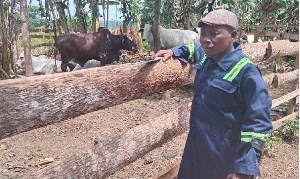Introduction:
In this currency status report, I will discuss the negative and positive factors that are currently impacting the Ghanaian economy in plain language devoid of economic jargon as much as possible.
The Ghanaian economy, especially its Cedi, has come under renewed pressure over the last few weeks I the global currency markets. So let’s look at the key factors that are driving the Cedi’s recent depreciation.
I have been receiving a slew of inquiries regarding the Cedi lately; so let me start with the adverse factors/negative shocks first:
Adverse factors
Falling commodity prices [Gold]:
Almost six decades after independence, Ghana’s economy remains largely, a primary commodity exporter. And unfortunately, two of Ghana’s biggest foreign exchange earners Gold and Oil, have been experiencing declining prices on the global markets.
Gold’s recent accelerated decline is attributed to US Federal Reserve Interest increase. Being that gold is not an interest bearing asset, meaning that, if you buy gold and hold onto it, it will not yield any interest the same way if you bought US treasuries. Hence investors are more likely to pull their money out of gold and rather invest it in assets that will yield them higher returns on their investments thereby causing the global market prices of gold to slide even further.
It is important to note that this is outside the control of any government in Africa. And unfortunately, all of the global gold producers, Australia, South Africa, Ghana, are equally impacted from a revenue reduction standpoint. There is not much the Ghana government can do about this except maybe look into increasing revenues from alternative sources. I will cover the issue of revenue diversification in another article.
Falling commodity prices [Oil]:
Global prices of Oil have been falling for many months; this is largely due to an oversupply by Saudi Arabia in an attempt to force out ward of threats from new market entrants, i.e. Shale Oil producers in the US. But recently, this problem has been worsened even further, due to the fact that Iran just started pumping Oil back into the global supply chain after sanctions were lifted, thereby causing Oil prices to fall even further.
Growing deficits:
Because revenues from our major foreign exchange earners keeps shrinking, the government has been borrowing from both foreign and local markets in order to keep up with its recurring payments such as payroll payments of civil servants, etc. As a result, Ghana’s debt load is getting bigger and its deficits widening.
Ghana is currently running high twin deficits (current and fiscal account deficits). Our fiscal deficit is 8% of GDP, and current account deficit 10% of GDP. Ghana’s government debt is 65% of GDP as of 2014, versus 39% average debt to GDP ratio for other African economies. It is worth noting that, 67% of Ghana’s debt is external, highlighting vulnerability to higher US rates and a stronger USD. Tightening US monetary policy will increase borrowing costs and put further pressure on the Ghanaian economy going forward.
US Fed rate increases:
Over the last few weeks, rumors of the impending interest rate hikes have been causing considerable anxiety in the global markets. Especially in the emerging markets. Emerging markets are usually the last place investors invest and the first place they exit when the opportunity presents itself.
If the Fed should go ahead and increase interest rates in September, that mean that, investors will stand a chance of making better return on their investments if they relocate their funds to the US versus keeping them in the emerging market fixed assets where they are likely to receive lower yields.
In the last few weeks, there have been many reports of capital flight from the emerging markets back into the US and how that is affecting numerous currencies including the Cedi. This has been causing the cedi as well as many African currencies to depreciate further over the last few weeks to the runner-up of the rate hike. The governments of emerging market economies including Ghana have no hand in the sovereign decisions of the US Fed.
I will provide a link to a comprehensive report on this matter and what the Ghanaian government can do to mitigate the risks from this event.
Chinese Yuan devaluation:
The Chinese devalued their currency, the Yuan, in an attempt to re-boost their slowing economy. Being that china is currently the world’s biggest economy and also the biggest trade partner to many African countries including Ghana, this incident has subsequently caused considerable investor anxiety and a thaw in investment into the region, since many investor are taking a wait and see approach. This means less investments going into African economies, which in turn puts emerging market currencies under depreciative pressures such as the one we are witnessing on the Cedi, amongst other things.
I will subsequently provide a link below to a comprehensive report on this subject and what the Ghanaian government can do in order to protect its interests against this global market risk.
Seasonality [increased importation by traders]:
Projecting a worst performance of the Cedi in the last quarter of the year. The Cedi has always had its worst decline in the last quarter of the year due to an escalation in import activity in the commercial sector due to the festive season. Importers have a huge demand for foreign goods they have to meet during this season, so naturally, demand for dollars will shoot up tremendously.
Profit repatriation by multi-nationals:
All these multi- national companies in the country always repatriate annual profits and dividends outside the country in the third and fourth quarters of the year. And that will certainly help drive the demand of dollars even higher.
The Good News
Declining Inflation:
Producer Price Inflation (PPI) and CPI (Food) declined: For the first time in almost 24months, inflation rates for food and producer prices fell. I reported in my August Outlook report that, after almost two years of upward inflationary pressures, I expected us to begin to see a positive change in this trend soon as a result of the fiscal and monetary policies being implemented by the government in partnership with the IMF.
In my opinion, this is by far the clearest indication that that Ghanaian economy has turned a new leaf. Now, how fast we can climb our way back to double digit GDP growth figures is another thing altogether. But it is definitely obvious that glimmers of an economic recovery are finally beginning to show our economic horizon. I will provide links below to two detailed reports that I wrote on the subject of improving inflation figures.
Improved resistance to depreciation:
The local currency has recorded a slight gain against the US dollar when it closed trading on Saturday gaining ?3.999 in value over the greenback. But that record was even better the following day when the cedi recorded a stunning 4.2 percent gain against its major trading partner to bring down the level of depreciation against the dollar to 20.4 percent from a peak of 26.2 percent on June 30.
Seasonal and Other Scheduled Inflows:
Expectations of the seasonal foreign exchange flows in the last quarter of the year will provide additional support to the currency. The mere anticipation of this positive economic event should serve as a psychological booster that should help improve both consumer and business sentiments in August.
Also, scheduled anticipated inflows of more than US$4 billion from the Eurobond issue, syndicated cocoa financing as well as other programmed inflows in the second half of the year will provide a strong buffer and help sustain stability in the foreign exchange markets as well.
Increased Donor Support:
Increased international Donor support for infrastructure related projects. A good example is the $700 million guarantee by the World Bank. The guarantees are expected to mobilize roughly $7.9 billion in new private investment for offshore natural gas, representing the biggest foreign direct investment in Ghana’s history.
Increasing Investor Confidence:
The outlook is supported by burgeoning confidence in the economic plans outlined by the government and its donor partners including the IMF.
Conclusion
Ghana is not immune to these international shocks. Especially in terms of financial investments into the Ghanaian financial system. Financial investors will be weary of investment given the international economic trends.
In the final analysis, all actors in the economy, government, consumers and businesses have a role to play. So let me use this opportunity to highlight some of the things Ghanaian’s can do to help improve the health of the Cedi.
The Government:
Twin deficits: The government of Ghana can only manage only those events within its control such as our current and fiscal account deficits. While at the same time trying as much as possible to mitigate out exposure to undesirable global dynamics from the Chinese and US economies.
Reduce profit repatriation and outflows: Ministry of Finance should incentivize multinationals to delay profit repatriation so as to prevent a further exacerbation of the Cedi’s depreciation.
Spend locally: I have personally observed a lot of projects being offered to foreign companies rather than local companies. I know this has been going on for ages, however, it is an unsustainable behavior on the part of the government. Foreign companies will usually repatriate their profits rather than reinvest in the Ghanaian economy. Unlike the local companies who are more likely to keep their profits in the local economy. Government needs to work harder to address this issue since it could be of substantial benefit to the Cedi’s medium and long-term stabilization.
Reduce money supply: The government must make efforts to buy its own currency. Buying its own currency makes it scarce, so the price will not go any lower (or at least at a lower speed).
Local products campaign: The government should consider running promotions and campaigns to encourage people to consume more locally manufactured goods. If people begin to spend more on local substitutes, pressure on the cedi should reduce substantially, since there will be little or no need for traders to spend so much foreign exchange to go overseas and buy these goods.
Consumers
Consume more locally manufactured goods: This is probably the most important thing that all Ghanaians should be doing. Let’s make a concerted effort to consume local food products, etc. If we do this, there will be little demand for all the foreign “junk” that is dumped on our markets everyday.
There is a lot of top quality local rice, salt, sugar, etc. If we all consumed more locally produced products during this Christmas season and beyond we should begin to start seeing the Cedi appreciate against other currencies.
Use/purchase foreign currencies sparingly: If you do not need foreign currency immediately or for any particular reason, do not purchase them, since purchasing foreign currencies for the sake of it or investments vehicles in anticipation of their appreciation against the cedi, thereby contributes further to the cedi’s depreciation.
Make foreign payments ASAP: if you need to make some form of payment in foreign currency such as paying for your child’s school fees abroad, etc. it will be wise to do that as soon as possible. I do not expect the cedi to experience any form of drastic depreciation between now and the end of the year, but at the same time, due to the enormity of the negative shocks against the cedi as I have outlined above.
Businesses
Effect on Exports: Currency depreciation may have a positive effect on sales that a local business makes to foreign parties, regardless of the currency used. If your business requires payment in Cedis for your exports, your customers may buy more of your products because their currency converts to more Cedis. You also may benefit if you accept payment in a foreign currency such as dollars. When you convert the dollars into Cedis, you will have more Cedis because of the increased exchange rate.
Effect on Imports: As far as imports are concerned, companies should begin to see an increase in their transaction costs as the US Dollar appreciates against the Cedi which will in turn make buying Dollars for import purposes, an increasingly expensive proposition. At this point in the economic calendar, companies should try to have at least 4 months of foreign exchange cover on hand if possible. This will only be necessary if you are the type of company that needs to import majority of your inputs for production.
Effect on Interest Payments: Interest payments a Ghanaian business makes on a loan to a foreign party are typically denominated in the foreign party’s currency. These payments will affect the Ghanaian business negatively because it costs you more Cedis to convert to the foreign currency. As a solution, local businesses should look into sourcing loans locally whenever possible.
Increased profits due to declining PPI: Lower producer prices likely mean consumers will pay less at the retail level. Lower PPI is considered good for the economy as it increases consumer spending while ultimately boosting corporate profits and stocks.
Opinions of Thursday, 3 September 2015
Columnist: Anang Tawiah















